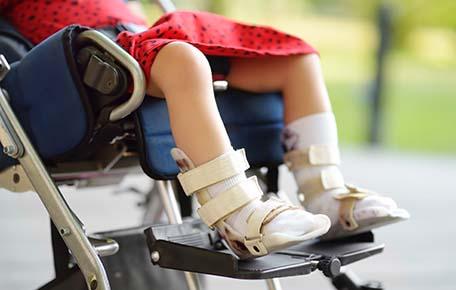Pediatric Muscular Dystrophy
Make an Appointment
Maybe you first noticed it when your child had frequent trips and falls. Or they started having trouble getting to the top of the stairs. Your child’s muscular dystrophy is making it harder and harder for them to enjoy their day-to-day lives.
There are several types of muscular dystrophy, but they all can cause weakness in your child’s muscles. You want them to have the best treatment possible. And you also probably have some questions you’d like answered.
At UVA Health Children’s, our neuromuscular program helps families just like yours. While there’s no cure for muscular dystrophy, there are treatments. Finding the right treatment, and getting the right diagnosis, can help you and your child effectively manage their muscular dystrophy.
Muscular Dystrophy Diagnosis & Treatment at UVA Health Children’s
If your child hasn’t already gotten a diagnosis of muscular dystrophy, we’ll work with you on getting the right diagnosis for their condition. If you have, we’ll talk to you about treatment options.
Muscular Dystrophy Treatment
For DMD, the most common form of MD, we offer the full spectrum of treatments, including genetic therapy. It’s an exciting option and we’re pleased to be able to offer it to our patients.
But no matter what form your child has, we offer the full range of treatments.
That includes:
- Medication
- Physical therapy
- Bracing and mobility aids
- Speech-language or feeding therapy
- Nutrition
We can also help with transitioning your child’s care to our adult neuromuscular care providers as they get older.
Types of Muscular Dystrophy
- Becker muscular dystrophy
- Congenital muscular dystrophy
- Duchenne muscular dystrophy (DMD)
- Emery-Dreifuss muscular dystrophy
- Facioscapulohumeral dystrophy
- Limb-girdle muscular dystrophy
- Myotonic dystrophy
Common Complications
Sometimes muscular dystrophy can cause complications. We’ll carefully watch for these at our follow-up visits. And we have specialists on hand to help with each of these complications.
Heart Rhythm Problems
Because the heart is a muscle, it may be affected by muscular dystrophy. When that happens, problems with keeping the heart in rhythm can occur. These can be uncomfortable and dangerous if allowed to progress.
Our children’s heart specialists are experts in muscular dystrophy’s effects on the heart. We’ll carefully monitor and treat as needed.
Breathing Problems
Some people with MD have a harder time breathing, especially when sleeping. We can work with a lung specialist to see what breathing supports may be helpful.
Our respiratory therapists can also help with more effective coughing. Effective coughs help clear airways, so kids can breathe more easily.
If it becomes necessary, we also have a .
Scoliosis
Some forms of muscular dystrophy cause spinal curving, called . Because scoliosis can make it harder to move and breathe, we’ll have an orthopedic specialist address it.
Swallowing & Speech Problems
Our are also able to help with things like eating and swallowing. If needed, we’ll help them with adjusting to and learning how to use a g-tube.
Emotional Distress
All of this can be a lot for a kid to deal with. We’ll help you get counseling. Our can even offer help for your whole family. We also have a . They can explain procedures in a way that’s easy for kids to understand.
Muscular Dystrophy Symptoms & Genetic Testing
Most of the symptoms across the different types of muscular dystrophy are very similar and include:
- Worsening muscle weakness
- Drooling
- Frequent falls
- Clumsiness
But all forms of muscular dystrophy are tied to different genes. They all progress differently, but they do all progress.
If your child has muscular dystrophy, we’ll do to confirm which type they have. This helps us talk about the specifics of the type your child has and find a treatment plan that’s right for them.
Get Support
We’re here for you. But many find additional comfort in talking to other families who are also going through this.
- Clinical TrialsFind a Clinical Trial
At UVA Health Children’s, we stay on top of the newest innovations. Learn more about clinical trials, including gene therapy.
- Equipment HelpLearn About Orthotics
Positioning aids, braces, and mobility aids can help make life at home easier. We’ll help you find the right tools for your child (and make sure they fit comfortably).
- Refer a PatientPatient Referral
Are you a provider concerned about a patient with late or regressing motor development? Refer them to our clinic, and we’ll work together with you to give them the best care.


